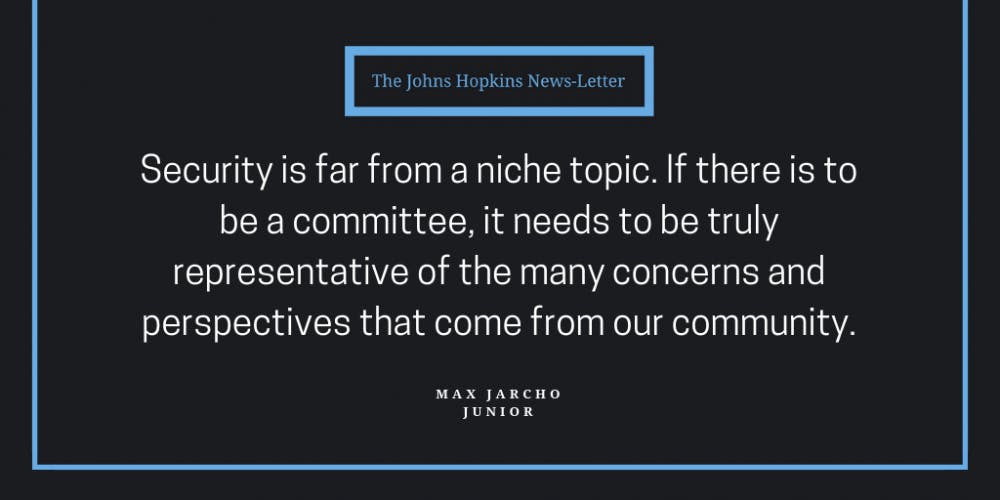In an email to students last Thursday, new Vice President for Security Melissa Hyatt welcomed student feedback on Hopkins security. She included a new email address and announced the creation of a new Student Advisory Committee for Security, whose role is to “address a variety of subjects” and “provide diverse perspectives” pertaining to security at Hopkins. The Committee is actively seeking applications.
These announcements, despite the surrounding intentions to create a system of student feedback and discussion on security, are an insufficient attempt to include students in conversations about security on campus.
The Committee to be created has a hard limit of 15 student members. Of these 15 members, 10 are “representatives from designated student groups/associations” and five are “at-large members.” The 10 student group representatives are not from the kinds of organizations coordinated by Student Leadership and Involvement, which tend to be co-curricular activities groups. The organizations these students represent are various student government associations, assemblies, senates and councils from across the University’s campuses. Already this prevents two-thirds of the committee from being students who can apply without nominations from the designated student groups.
Overall the current composition is troubling. It ensures that more than half of the seats on the Committee are taken by graduate students. Why would the administration design such a committee with an uneven balance between undergraduate and graduate students? It’s illogical.
It’s not that graduate students will act as a direct barrier for meaningful discussion of security. But since the administration has designed this committee with specific rules to ensure parity in per-campus representation, they should ensure approximate parity between undergraduate and graduate representation.
The real problem, though, arises when considering the representation of multiple campuses. Of the 10 members from designated student organizations, two are from the Homewood Campus. The remaining eight are from other locations such as the School of Medicine, School of Education and the School of Advanced International Studies in Washington, D.C.
I understand the goal of far-reaching representation, but security is a hyper-local issue. This is not to say that a discussion of security at the Homewood Campus has no bearing on security at the East Baltimore med campus. But a committee for student feedback on security will not be as efficient as individual committees for each campus, where students can discuss -- as Hyatt writes in her email -- “recruitment and training of personnel, security-related communications and reports, and new safety initiatives” in a diverse community setting of students who share the same campus and interests.
An integrative committee of per-campus security and higher-level administrators could then link feedback and discussion from the campus committees together, weighing shared concerns and creating solutions to both local and cross-campus issues. While it’s true that we cannot guarantee that administrators will respond to the demands most important to students at a particular campus, the trade-off would be worth accepting. It would allow more students to effectively discuss their ideas on their respective campuses.
My intent with this idea is not to be more bureaucratic but instead more realistic in terms of the local and high-priority nature of security. Security is an inherently local community issue that becomes relevant for every student who is a part of a campus. The division itself is called Campus Safety and Security. I’d much rather discuss issues locally and place representative trust in our administrators to voice our concerns for the larger community, as opposed to being one of at most seven undergraduate voices on a multi-campus 15-person committee designed for discussion at the administration’s own convenience.
Security is far from a niche topic. If there is to be a committee, it needs to be truly representative of the many concerns and perspectives that come from our community. How can the administration ensure that the remaining five open seats are used to truly represent the rest of our voices?
Finally, these new channels Hyatt is providing should allow for discussion that administrators will actually act upon. For the astronomical number of us that won’t make it onto the committee, we have instead a public email address that’s now open for Hyatt to “receive” feedback.
This is sure to amass at least an initial deluge of emails, so I understand that Hyatt cannot promise to respond to every message. However, Hyatt and her staff should make a promise to read every email so that the rest of the community can be heard. With major issues at stake, such as the creation of a private police force on campus; the aftermath of the campus lockdown in July (on which there have been minimal follow-ups); and concerns over neighborhood security which affect my peers and myself continuously, engaging in conversations on these issues is more important than ever. I’m ready to participate in effective discussions about campus security, and I hope that the administration is too.
Max Jarcho is a junior pursuing a double major in Computer Science & Film and Media Studies. He is from Ridgefield, Conn.

















